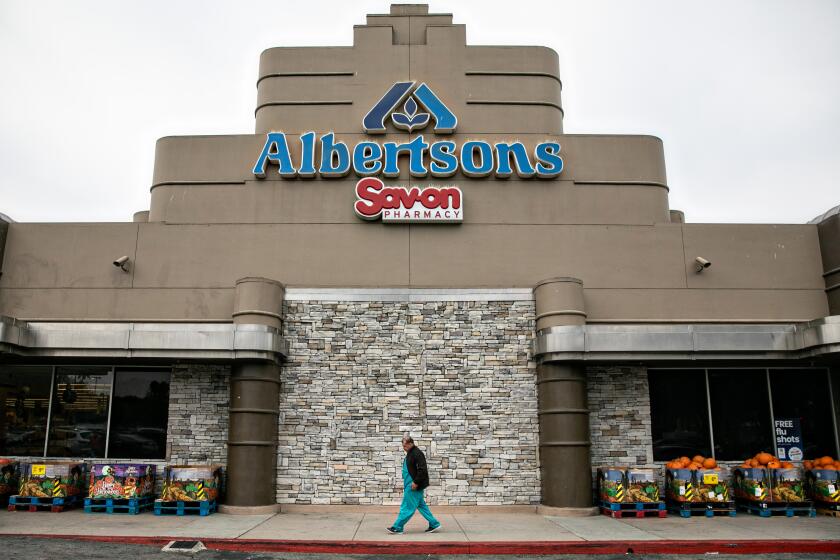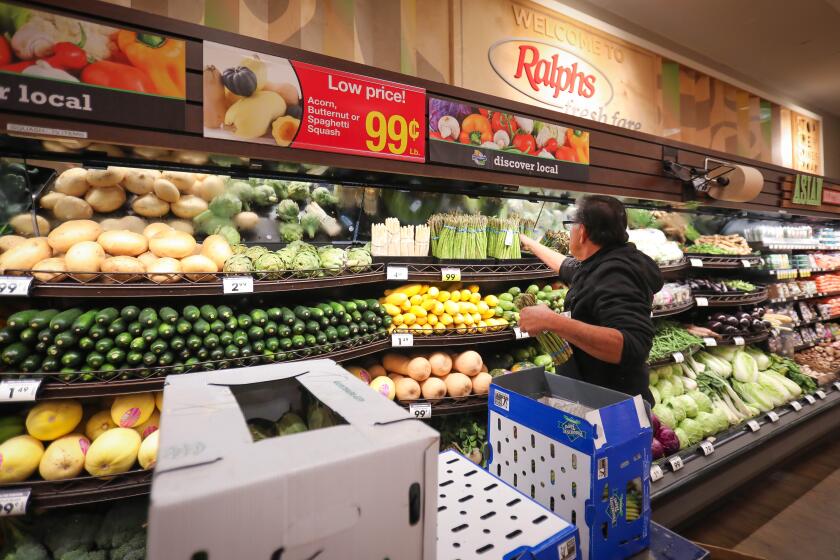California preparing lawsuit to block Albertsons-Kroger deal

- Share via
California is preparing a lawsuit to block Kroger Co.’s $24.6-billion acquisition of Albertsons on concerns the deal could hurt consumers and workers, Atty. Gen. Rob Bonta said.
“We are moving toward acting,” Bonta told reporters Thursday in Washington. “Right now, there’s not a lot of reason not to sue.”
Bonta said he met with Federal Trade Commission Chair Lina Khan earlier in the day and discussed the deal. The FTC has been conducting its own review of the merger, which would combine the two biggest traditional supermarket chains in the United States.
A Kroger spokeswoman said the company’s acquisition of Albertsons would bring “lower prices for customers, secure union jobs and more food directed to hungry families, with 10 billion meals committed to people in need across America by 2030.” She added: “Only nonunionized retailers, like Walmart and Amazon, will benefit if this merger is blocked.”
Albertsons said in an email that the deal “would ensure that our neighborhood supermarkets, some of which have been serving their communities for over 100 years, can better compete with these retailing giants.”
Contributor: The grocery chain wars prove that the modern supermarket model isn’t sustainable
The model for the first supermarket forces grocery stores to chase higher volume to fund cheaper prices. For chains like Kroger and Albertsons, this means growing bigger is your only chance at survival.
The grocers have also said the deal would let them boost investment in online offerings. Kroger, based in Cincinnati, operates chains such as Ralphs, King Soopers and Harris Teeter, in addition to its namesake stores. The banners of Boise, Idaho-based Albertsons include Safeway, Acme and Jewel-Osco. In May, Kroger Chief Executive Rodney McMullen said the company is committed to fighting for the deal in court if needed.
Last month, the companies said they would sell 413 stores to C&S Wholesale Grocers in a divestiture designed to help win antitrust approval.
Examining options
Bonta said that California is still looking at the proposed divestiture and hasn’t definitively decided to file a case.
The state could challenge the merger on its own, or it could partner with the FTC and other states on a lawsuit. California, which has the largest antitrust staff of any in the country, has filed its own merger challenges when federal enforcers have declined, notably joining with other states in an unsuccessful effort to block T-Mobile US from purchasing provider Sprint in 2020.
“We are very concerned about it,” Bonta said of the Kroger-Albertsons deal. He highlighted the potential for higher prices, reduced choice for consumers, labor issues and adverse effects on California agriculture.
Albertsons and Kroger say their merger would benefit consumers. The history of mergers, in the grocery business and elsewhere, offers cause for skepticism.
Last month, the FTC’s Khan attended a listening session in Las Vegas about the deal along with Nevada Atty. Gen. Aaron Ford. At the event, Khan reiterated her skepticism about the effectiveness of large divestitures like the one proposed by Kroger and Albertsons.
The secretaries of state or treasurers from 11 states have pressed the FTC to block the deal over concerns it could harm wages and hurt farmers and consumers. The United Food and Commercial Workers union, which represents several hundred thousand Kroger employees, publicly opposes the merger.
More to Read
Inside the business of entertainment
The Wide Shot brings you news, analysis and insights on everything from streaming wars to production — and what it all means for the future.
You may occasionally receive promotional content from the Los Angeles Times.











